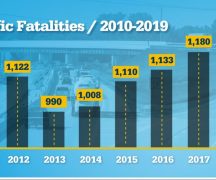Some Republican lawmakers want to do away with an Ohio business tax that helps to fund state services.
A new bill proposes to repeal Ohio’s “commercial activity tax” (CAT for short) by phasing it out over the next five years.
This tax is levied on businesses with over $150,000 in yearly taxable gross receipts — in other words, regardless of the net profits or losses recorded in a given calendar year. The taxed rate is 0.26% for gross receipts beyond $1 million.
Ohio is one of the few states that taxes businesses on their total sales rather than on profits through a corporate income tax. CAT was enacted here in 2005 as part of a business tax overhaul that saw Ohio phase out its version of a corporate income tax as well as a separate tax on business machinery and equipment.
Still, more than a decade later, critics say CAT disproportionately hurts struggling businesses by taxing all earnings instead of profits.
The Buckeye Institute think tank advocates for repealing the tax. The group argues doing so would lessen the burden on existing businesses as well as make Ohio a more attractive climate for other businesses to relocate here.
Rea S. Hederman Jr., a vice president of policy for The Buckeye Institute, called CAT an “antiquated, Depression-era tax that hampers growth and prosperity for employers and employees across the country.”
Hederman argued last year that CAT is “particularly damaging” during “periods of economic distress” such as the pandemic, with businesses on the hook for paying the tax amid a difficult 2020.
House Bill 234, introduced last week by Republican state Reps. Jennifer Gross of West Chester and Riordan McClain of Upper Sandusky, proposes to phase out CAT by the year 2026. Their plan is co-sponsored by more than a dozen other Republican lawmakers.
Also last week, the Ohio General Assembly unanimously voted to exclude Bureau of Workers’ Compensation dividends and Paycheck Protection Program loans from being taxed under CAT.
A separate bill being considered by lawmakers, Senate Bill 45, would provide another CAT exclusion for Ohio businesses that are suppliers for a “megaproject” operator. Such megaprojects are defined as those involving a major investment into “unique sites, extremely robust utility service, and a technically skilled workforce.”
Ohio law already gives tax credits to megaproject developers; SB 45 would add in other businesses providing goods and services toward the project. The bill would also extend how long business recipients are eligible to receive these tax credits.
Policy Matters Ohio, a progressive think tank, is more critical of the “two-for-one swap” in 2005 that enacted CAT in place of other taxes. The group points to data showing CAT has resulted in a sizable tax cut for Ohio businesses, which it argues has impacted state funding toward education and local governments.
The think tank proposes that Ohio retain CAT and reinstate the corporate income tax — with businesses paying one or the other depending on which is higher. This structure would only affect larger, more profitable companies, the group asserts.
HB 234 to repeal CAT awaits a committee assignment and its first hearing.
***
Also from Ohio Capital Journal:
Special Report: Dozens of members of Congress are vaccinated against COVID-19, but some still hesitate
WASHINGTON — Members of Congress were among the first people in the U.S. to have access to the sought-after COVID-19 vaccine when the initial doses became available in December.
Three months later, a States Newsroom survey across 22 states — making up a large swath of Congress — found at least 155 members of the U.S. House and Senate have been vaccinated, based on a tally of responses from their offices and other public statements. Most, but not all, are Democrats, even as pollsters find greater hesitancy and even disinterest among Republicans in the broader U.S. adult population when it comes to the vaccine. READ MORE
Report: Ohio among states choosing child care funding with fewer regulations
A new report showed Ohio was one of many states in the nation choosing more flexible funding for their child care and assistance programs, rather than child care funding with federally-regulated rules on health and safety.
A recent Bipartisan Policy Center study on Temporary Assistance for Needy Families (TANF) funding and Child Care Development Funds (CCDF) showed that more and more states are moving away from CCDF monies, in favor of making their own regulations for child care and cash assistance.
In fiscal year 2019, states nationwide spent more than $5 billion on child care services, according to the study, and they receive allocations from the two different federal funding sources. Nationally, $8.19 billion was provided to states in CCDF money “to help them improve the quality and affordability of child care for low-income working parents,” according to the BPC. READ MORE
Trans Day of Visibility offers chance for community to stand in solidarity and support
Visibility within the transgender community is often a Catch-22, especially for trans people of color, or those living in rural, conservative areas. Hiding one’s identity can be a damaging experience and increase feelings of isolation, stigma and shame. But standing out as a trans person can make someone a target for discrimination or violence.
As a trans man who studies transgender health and well-being, I believe Trans Day of Visibility – celebrated annually on March 31 – is an important day that allows community members to come together and find support and solidarity by knowing they are not alone. READ MORE





